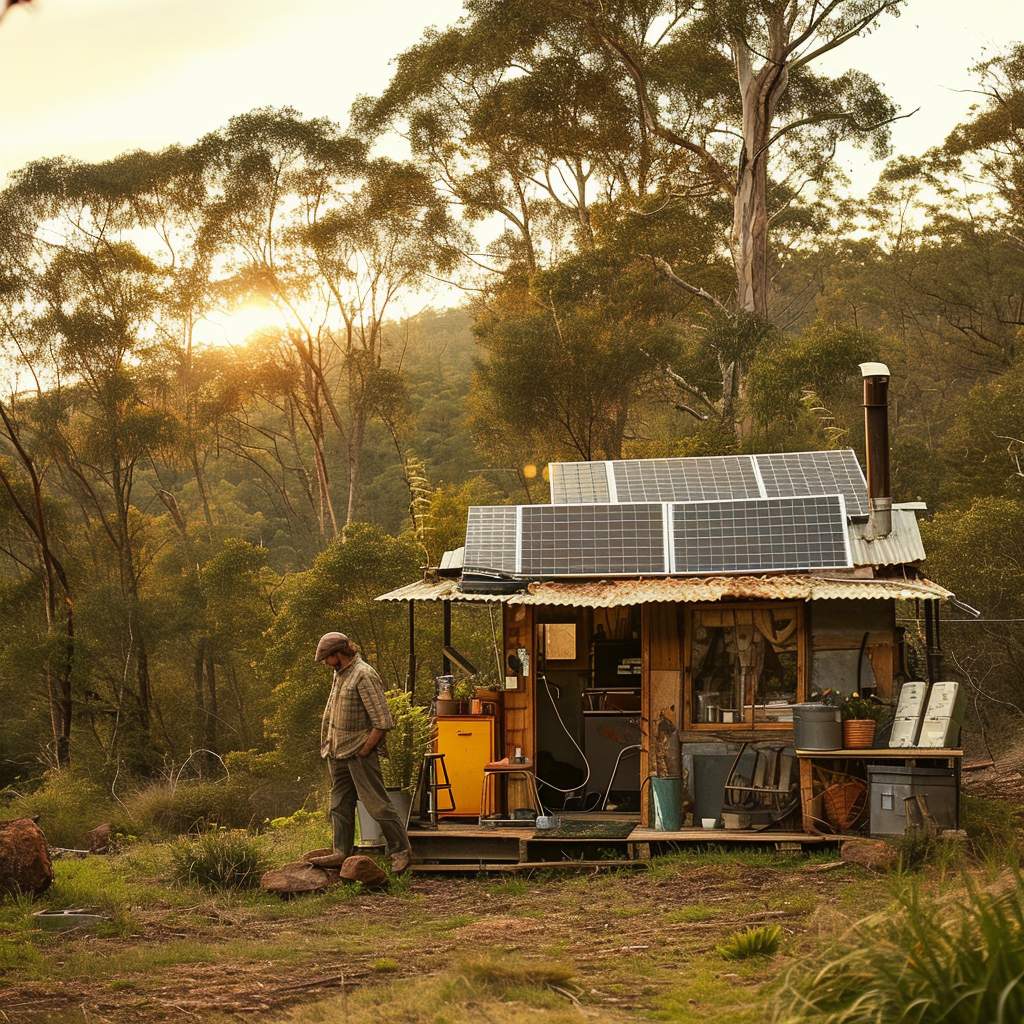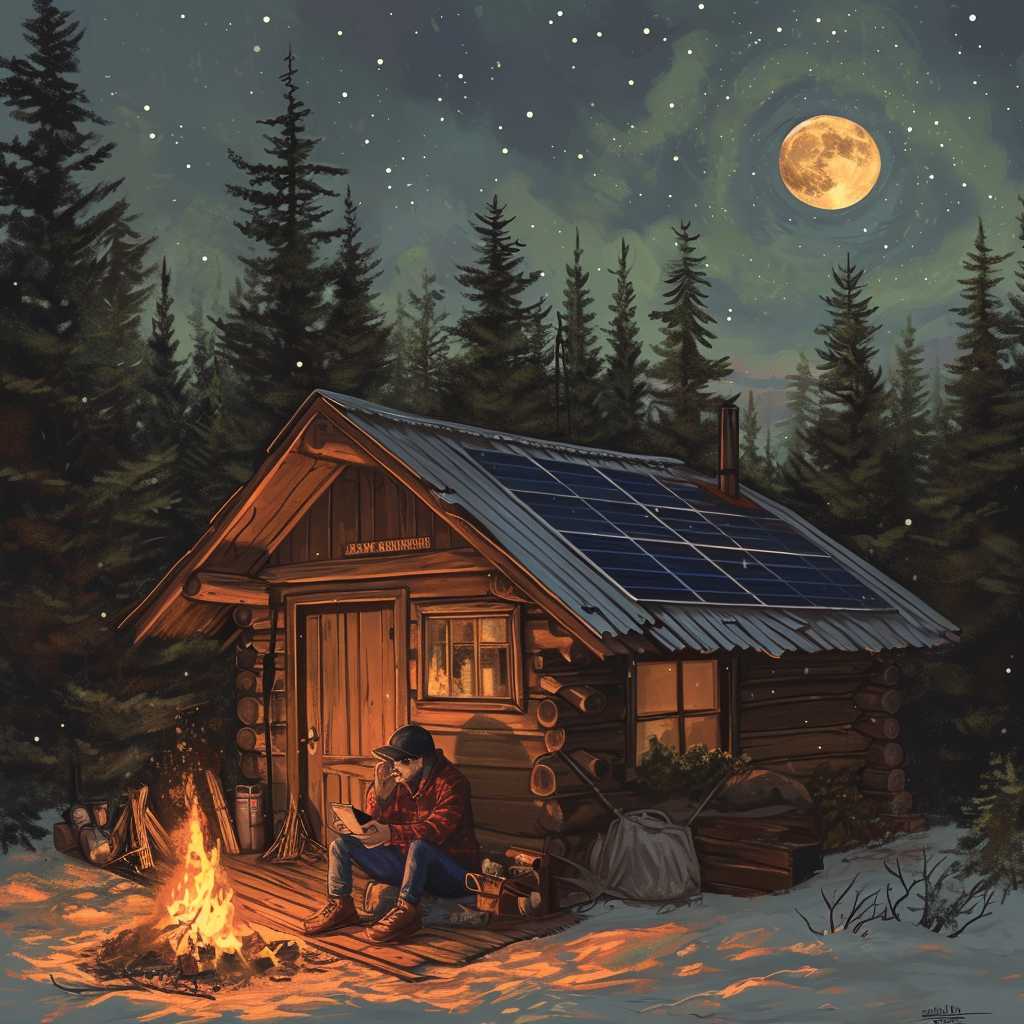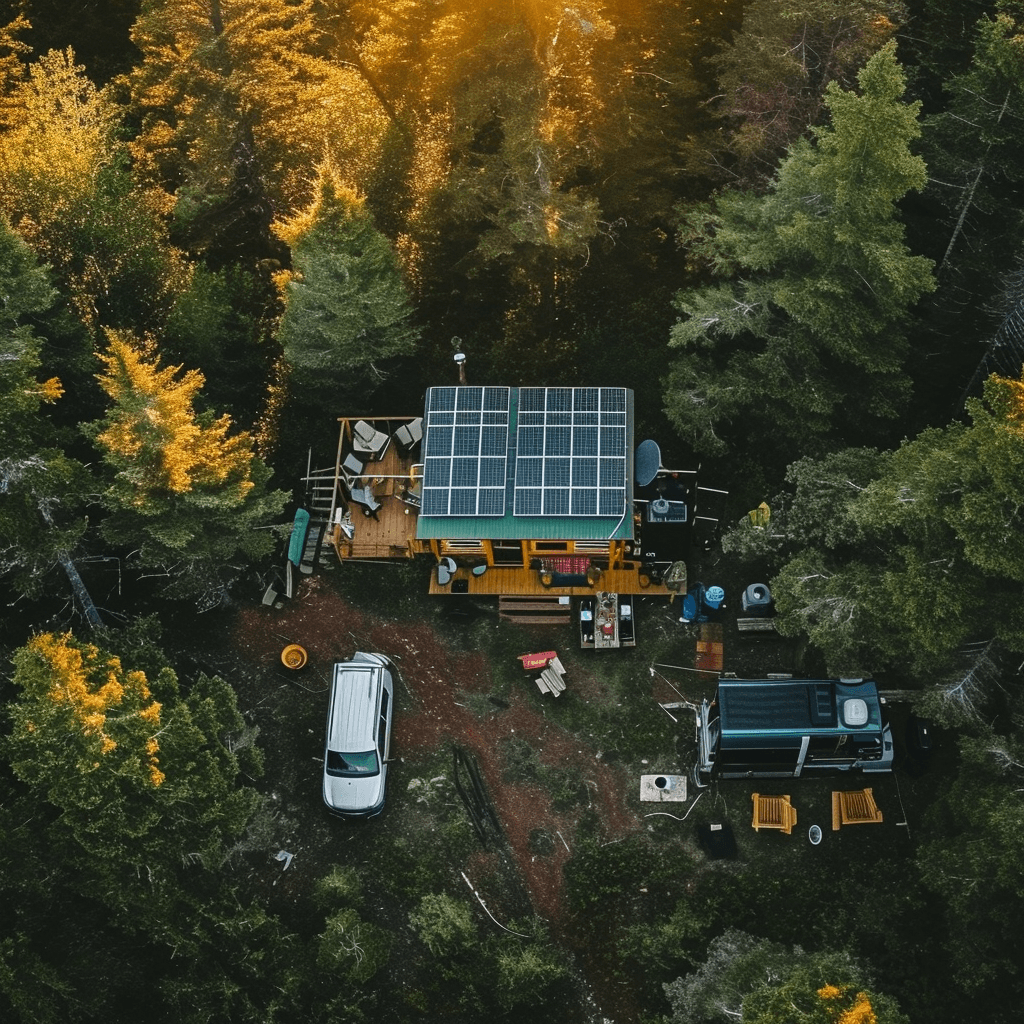Have you ever wondered what do off-grid people do? You know, those individuals who have chosen to disconnect from the traditional grid and live a self-sufficient lifestyle? It’s fascinating to think about how they manage without the modern conveniences we often take for granted. In this article, we’ll explore the lifestyle of off-grid living and delve into what these individuals do to sustain themselves and their communities. Whether you’re curious or considering a similar lifestyle change, you’re sure to learn something new!
Living off-grid means having to find alternative ways to meet your basic needs. Off-grid people often generate their own electricity through solar panels or wind turbines, allowing them to power their homes and devices without reliance on the electric grid. They also collect rainwater or implement water filtration systems to ensure a clean and sustainable water supply. In terms of food, many off-grid individuals grow their own fruits, vegetables, and even raise livestock for meat or dairy products. It’s a lifestyle that requires resourcefulness, creativity, and a deep connection to the environment.
But off-grid living is not just about meeting basic needs; it’s also about embracing a simpler, more intentional way of life. Without the constant distractions of technology and the fast pace of modern society, off-grid people have the opportunity to focus on what truly matters to them. They may engage in activities like gardening, woodworking, or crafting as a way to pass the time and express their creativity. Additionally, many off-grid communities prioritize sustainable practices, such as recycling, composting, and using renewable energy sources, to minimize their impact on the environment.
In this article, we’ll dive deeper into the specific activities and practices that off-grid people engage in to sustain themselves. From building their own homes to developing alternative energy sources, there is much to learn and appreciate about this unique lifestyle choice. So, whether you’re simply curious about how these individuals make it work or considering a similar path yourself, stay tuned as we explore the fascinating world of off-grid living.
Exploring the Lifestyle: What Do Off-Grid People Do?
Living off the grid is a lifestyle choice that more and more individuals are opting for in today’s world. In a society where modern conveniences are readily available, some people are looking to disconnect from the grid and embrace a simpler, more self-sufficient way of living. But what exactly do off-grid people do? Let’s explore the various aspects of this lifestyle and discover the benefits it offers.
Benefits of Off-Grid Living
Reduced reliance on public utilities
One of the primary benefits of off-grid living is the reduced reliance on public utilities. When you live off the grid, you are not dependent on the government or private companies for your electricity, water, and waste management needs. Instead, you take control of your own resources, which can lead to greater self-sufficiency.
Greater self-sufficiency
Living off the grid allows you to become more self-sufficient in many areas of life. By generating your own energy and managing your own water and waste, you are not only able to sustain yourself but also reduce your impact on the environment. Off-grid living empowers you to take charge of your own resources and become less dependent on external sources.
Environmental sustainability
One of the major reasons why people choose to live off the grid is to lead a more environmentally sustainable lifestyle. By relying on renewable energy sources like solar power, wind turbines, and hydroelectric generators, off-grid individuals can significantly reduce their carbon footprint. Additionally, implementing rainwater harvesting systems and utilizing composting toilets minimize water wastage and contribute to a more sustainable environment.

Building and Maintaining Off-Grid Homes
Choosing suitable locations
When it comes to building an off-grid home, location is key. Off-grid individuals often search for areas with ample sunlight for solar power, consistent wind flow for wind turbines, or access to running water for hydroelectric generators. Additionally, factors such as climate, access to basic amenities, and the availability of natural resources also play a crucial role in determining the suitability of a location for off-grid living.
Designing energy-efficient structures
Designing energy-efficient structures is essential for off-grid living. Utilizing passive solar design techniques, such as orienting the house to maximize sunlight and using insulation to retain heat, can help reduce the energy needed for heating and cooling. Additionally, optimizing natural ventilation and using energy-efficient appliances and lighting contribute to overall energy conservation in off-grid homes.
Selecting renewable energy sources
Off-grid living requires harnessing renewable energy sources to meet daily energy needs. Solar power systems are a popular choice among off-grid individuals, as they allow for the conversion of sunlight into usable electricity. Wind turbines can also be installed in areas with consistent wind flow to generate power. Hydroelectric generators utilize flowing water to generate electricity, making them an ideal option for properties with access to rivers or streams.
Water and Waste Management
Implementing rainwater harvesting systems
Water conservation is essential for off-grid living, and implementing rainwater harvesting systems is a key component of managing water resources efficiently. By collecting rainwater from roofs or catchment areas, off-grid individuals can store and utilize this water for various purposes like drinking, cooking, and gardening. This helps reduce reliance on groundwater or municipal water supply.
Utilizing composting toilets
In off-grid homes, traditional flush toilets are often replaced with composting toilets. These toilets turn human waste into compost through a natural decomposition process, eliminating the need for water-based sewage systems. Composting toilets are not only eco-friendly but also help in creating nutrient-rich compost that can be used in gardens or agricultural activities.
Minimizing water wastage
Off-grid individuals are mindful of water usage and strive to minimize wastage. Water-saving techniques like low-flow fixtures, efficient irrigation systems, and rainwater conservation help in achieving this goal. By reducing water wastage, off-grid individuals can maximize the efficiency of their water resources and contribute to sustainable living practices.
Food Production and Preservation
Establishing organic gardens
Off-grid living often involves establishing organic gardens for food production. Growing your own fruits, vegetables, and herbs allows for a regular supply of fresh and nutritious produce. Organic gardening practices, which avoid the use of synthetic pesticides and fertilizers, promote healthier and more sustainable agricultural practices.
Raising livestock and poultry
To enhance self-sufficiency, some off-grid individuals choose to raise livestock and poultry. This includes raising chickens for eggs, goats for milk, or even larger animals like cows for meat or dairy products. By raising their own animals, off-grid individuals can have a steady supply of animal products while reducing reliance on commercial farming practices.
Canning and fermenting for long-term food storage
Off-grid individuals often adopt methods like canning and fermenting to preserve their food for long-term storage. Canning involves preserving food in jars and sealing them to prevent spoilage. Fermenting, on the other hand, is a natural preservation process that utilizes beneficial bacteria to transform food into nutritious and flavorful products, such as sauerkraut or kimchi. By preserving their own food, off-grid individuals can extend the shelf life of their harvest and reduce food waste.
Off-Grid Energy Solutions
Solar power systems
Solar power is one of the most common off-grid energy solutions. By installing solar panels on rooftops or open areas, off-grid individuals can harness the power of sunlight to generate electricity. This clean and renewable energy source provides a reliable power supply for various needs, from powering household appliances to charging electronic devices.
Wind turbines
In areas with consistent wind flow, wind turbines can be an effective off-grid energy solution. Wind turbines capture the kinetic energy of the wind and convert it into electricity, which can be used to power homes or charge batteries for future use. Wind power is a reliable and renewable energy source that can supplement or even replace solar power in certain locations.
Hydroelectric generators
Properties with access to flowing water, such as rivers or streams, can utilize hydroelectric generators to generate electricity. These generators use the force of moving water to rotate turbines and produce energy. Hydroelectric power is a clean and renewable energy source that provides a continuous and reliable power supply for off-grid individuals.
Alternative Transportation Methods
Bicycles and electric scooters
As part of an off-grid lifestyle, alternative transportation methods like bicycles and electric scooters are embraced. These modes of transportation are not only cost-effective but also environmentally friendly since they eliminate the need for fossil fuel consumption. Off-grid individuals often prioritize active transportation methods to reduce their carbon footprint and maintain a healthier lifestyle.
Horse-drawn carriages
In certain off-grid communities, horse-drawn carriages remain a popular and sustainable transportation option. These carriages are powered by horses and offer a nostalgic and eco-friendly way to travel short distances. Horse-drawn carriages are not only a practical mode of transportation but also reflect a connection to traditional and simpler ways of living.
Hybrid and electric vehicles
While not entirely off-grid, hybrid and electric vehicles are gaining popularity among off-grid individuals. These vehicles often utilize both traditional fuels and electric power, offering a more sustainable alternative to conventional gas-powered cars. The use of hybrid or electric vehicles in off-grid communities helps reduce reliance on fossil fuels and promotes the use of cleaner and more efficient transportation options.
Off-Grid Communication and Technology
Satellite internet and phones
In remote off-grid locations, access to reliable internet and phone connectivity can be challenging. However, satellite internet and phones provide a solution for reliable communication in these areas. By utilizing satellite technology, off-grid individuals can stay connected with the outside world, access information, and even facilitate remote work or educational opportunities.
Off-grid communication devices
Off-grid communication devices, such as two-way radios or walkie-talkies, are essential tools for off-grid living. These devices operate on radio frequencies, allowing individuals to communicate within a specific range without the need for cellular networks or internet connection. Off-grid communication devices are reliable and provide a means of communication in areas with limited or no access to traditional communication networks.
Renewable energy-powered gadgets
Off-grid individuals often rely on renewable energy to power their electronic devices. Portable solar-powered chargers, for example, allow individuals to charge their phones or tablets using sunlight. Similarly, hand-cranked or solar-powered radios provide access to news, entertainment, and weather updates without relying on grid electricity. These renewable energy-powered gadgets ensure that essential electronic devices can be used even in off-grid environments.

Educational Pursuits and Personal Development
Homeschooling and self-directed learning
Off-grid living provides an opportunity for educational pursuits and self-directed learning. Many off-grid families choose to homeschool their children, tailoring their education to their specific interests and needs. This approach allows for a more individualized and holistic learning experience, promoting creativity, critical thinking, and self-reliance.
Engaging in creative hobbies
Living off the grid often encourages individuals to engage in creative hobbies. Whether it’s painting, woodworking, or playing musical instruments, off-grid individuals have more time and space to explore their artistic side. These creative pursuits provide a sense of fulfillment and are a way to relax and recharge in the tranquil environment of off-grid living.
Learning traditional skills
Off-grid living often involves learning and practicing traditional skills that may have been forgotten in mainstream society. Skills like carpentry, blacksmithing, or preserving food through canning and fermenting are passed down from generation to generation. By learning these traditional skills, off-grid individuals not only become more self-sufficient but also keep these valuable traditions alive.
Healthcare and Well-being in Off-Grid Lifestyle
Holistic healthcare practices
Off-grid individuals often embrace holistic healthcare practices and alternative medicine. These practices emphasize the overall well-being of an individual, including physical, mental, and spiritual aspects. Natural remedies, herbal medicine, and holistic healing techniques are commonly used to address health issues and promote a balanced lifestyle.
Herbal medicine and natural remedies
In off-grid communities, herbal medicine and natural remedies play a significant role in maintaining health and treating common ailments. By utilizing the healing properties of plants and herbs, off-grid individuals can address various health issues without relying on conventional pharmaceuticals. Herbal medicine offers a more natural and sustainable approach to healthcare.
Physical and mental well-being
Living off the grid provides ample opportunities for physical and mental well-being. The active lifestyle, which often involves manual labor, outdoor activities, and exposure to nature, promotes physical fitness. Additionally, the peace, quiet, and reduced stress associated with off-grid living contribute to improved mental well-being. The absence of the constant noise and distractions of city life allows for relaxation, mindfulness, and better mental clarity.
Conclusion
Exploring the off-grid lifestyle opens the door to a unique and fulfilling way of living. From reduced reliance on public utilities to greater self-sufficiency and environmental sustainability, off-grid living offers numerous benefits. By embracing off-grid practices like building energy-efficient structures, managing water resources efficiently, and adopting renewable energy solutions, individuals can reduce their impact on the environment and live a more sustainable lifestyle. Engaging in creative hobbies, learning traditional skills, and prioritizing holistic healthcare and well-being contribute to personal growth and fulfillment. Living off the grid empowers individuals to live sustainably and independently, ultimately providing valuable insights and inspiration for a more connected and conscious way of life.




